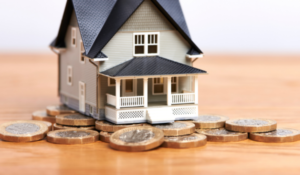 UK house prices fell in August for the first time this year, according to new data from property website Rightmove.
UK house prices fell in August for the first time this year, according to new data from property website Rightmove.
The average UK house price fell £1,076 to £337,371 - a dip of 0.3% - in August, marking the first time house prices have dropped in 2021. This follows the winding down of the government’s stamp duty holiday at the end of June, with the tax break due to be withdrawn completely at the end of September. It is anticipated prices may remain buoyed until that point, when the stamp duty exemption on the first £250,000 of a property's value will return to the pre-pandemic level of £125,000.
For more information on the stamp duty holiday, head to our article "Everything you need to know about stamp duty".
What is happening to asking prices in the UK?
According to the Rightmove House Price Index, the average asking price for a property in the UK is now £337,371, compared with £338,447 in July. London suffered the largest monthly decrease, with the average property value slipping 1.5% in August, while Wales bucked the trend with a 2.3% jump.
Despite the monthly decrease, the average UK house price in August is still up significantly from 2020's average of £239,196, reflecting the strong growth of the housing market in 2021.
Change in asking prices for August 2021
| Month | Average asking price | Monthly change | Annual change |
| August 2021 | £337,371 | -0.30% | 5.60% |
| July 2021 | £338,447 | 0.70% | 5.70% |
(Data courtesy of Rightmove)
Changes by market sector
The average first-time buyer properties saw the largest monthly change, up £1,328 (+0.60%) , while third-time buyer and beyond homes appear to be the cause of the average price slip, down £4,699 (-0.80%) on July.
Second-time buyer properties saw a modest £975 (+0.30%) increase in August.
| Sector | August 2021 | July 2021 | Monthly change | Annual change |
| First-time buyers | £208,714 | £207,386 | +0.60% | 3.70% |
| Second-time buyers | £309,643 | £308,668 | +0.30% | 6.60% |
| Third-time buyers and beyond | £616,421 | £621,120 | -0.80% | 9.40% |
(Data courtesy of Rightmove)
This could be as the upper end of the market tends to be more affected by seasonal factors, such as summer holidays, and has also seen the largest reduction of stamp duty exemptions over the past few months.
Meanwhile, first and second-time buyer demand remains strong, pushing average prices up to record highs even as the stamp duty holiday begins to wind down.
Housing demand trends
Late summer tends to be a quieter period for the property market, however demand has remained unseasonably high, up 56% year-on-year in the first week of August. Rightmove has stated that the likelihood of sellers finding a buyer for their property is currently at an all-time high, with the average time from a house being listed and marked as sold (subject to contract) at a record 36 days, an entire month faster than it had been in February 2020.
This is partly due to record low stock, as buyers quickly "hoover up" newly-listed properties, and in turn drive prices higher as demand starts to outweigh supply.
What is the Rightmove House Price Index?
Rightmove's House Price Index is based on asking-price figures, which may be less accurate than other markers, as asking prices often fluctuate once buyer and seller are able to negotiate on a purchase price deemed suitable by both parties. This can be higher or lower than the initial asking price.
The UK House Price Index is the most accurate house price index, as it is calculated based on completed sales from data sourced from HM Land Registry and other government sources. However, there is a significant lag in the data being published, with the latest set of figures dating to May 2021 when the average UK house price at the point of purchase was reportedly £254,624 - although this reflects the fact the data was collated during the period of high activity, near the end of the first phase of the stamp duty holiday.
Other house price indices, such as those belonging to Halifax and Nationwide, use data from their own mortgage approvals, which could also offer a more accurate reflection of the average UK house price than the initial asking price. You can find out more about the different house price indices here.
For more detailed analysis of whether house prices are likely to rise or fall, read our article "What is going to happen to UK house prices?"





